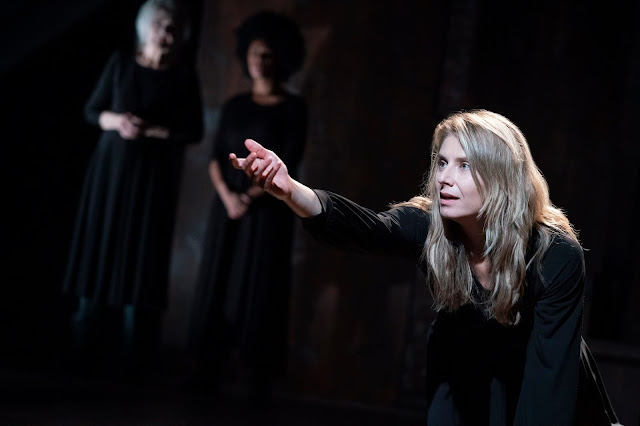| "Fair is foul, and foul is fair." - The Three Witches, Macbeth  |
| Corey Stoll in Macbeth. Photo: Joan Marcus. |
What did Erin think?
Macbeth is a play that can easily get out of hand. Witches, murders, and a semi-psychotic title character can quickly devolve into a blood bath starring a raging tyrant, with a side show of Satanic rituals.But that's not the approach John Doyle takes in directing Classic Stage Company's Macbeth. Starring Corey Stoll and Nadia Bowers, the production remains grounded and thoughtful even in its most dramatic moments. Subtly powerful, it's a play about the duality of human nature and the fragility of virtue, emphasizing the uncanny within rather than the supernatural without.
Rather than a raging tyrant, or perhaps in spite of being a raging tyrant, Corey Stoll's Macbeth somehow preserves a shred of humanity and civility right up to the end. From his dilemma over killing Duncan to his realization of his coming defeat at the hands of Macduff, each step in his descent toward ruin occurs so naturally that we might miss it if we're not paying attention.
Yet the difference between his character at the beginning and at the end is staggering. After his brutal string of murders--Malcolm, Banquo, Macduff's wife and children--Macbeth has very nearly lost his humanity entirely. And yet, there's still something deeply intriguing and even likable about him. At the height of his corruption, he sits on the floor and quietly speaks the famous "tomorrow and tomorrow and tomorrow," in tones that suggest immense suffering and pathos.
Nadia Bowers' Lady Macbeth is the perfect counterpoint to her husband: ambitious at whatever cost, but clear-headed enough to play the game with more subtlety--and to know when to stop. Her lines are sharpened to a razor point (and often cut her husband), but always delivered with such presence of mind that it's clear this woman knows exactly what she's doing. Of course, this sharpness and presence of mind make her mad scene all the more striking.
The costumes (plain black clothing and gray tartans) and set (a simple wooden stage with a huge throne) suggest a timeless setting and a story that could happen in any period of the earth's history. Like Stoll's sensitive portrayal of Macbeth, the simplicity of the set and costumes eliminates any distractions, pointing us again and again to what's actually happening before our eyes: a shattering of the fragile divide between sanity and madness, virtue and depravity, ambition and perversion.
Even the three weird sisters melt into the crowd, with the role played by the entire company (minus Macbeth) speaking in unison. Perhaps their semi-absence suggests that we don't need occult powers to spur us on in committing atrocities--we're perfectly capable of spurring on ourselves.
Meanwhile, that Macbeth is an almost likable tyrant forces us to question what we think we know of good and evil, who we are prepared to offer our sympathy to, and what hidden demons lurk inside our own selves: simply waiting for the right opportunity to make an appearance.
How can I get tickets?
You can buy tickets here.
Subject to availability, CSC also offers $30 rush tickets one hour before the performance (and $20 student rush tickets with an ID), in person at the box office. Limit is one ticket per person.
How long is it?
1 hour and 40 minutes without an intermission.
What else do I need to know?
Macbeth runs from October 10 to December 15.
Is it appropriate for all ages?
It's Macbeth. That being said, while it is violent, there's very little blood, and no sex or nudity.
 |
| Nadia Bowers in Macbeth. Photo: Joan Marcus. |
EJK




